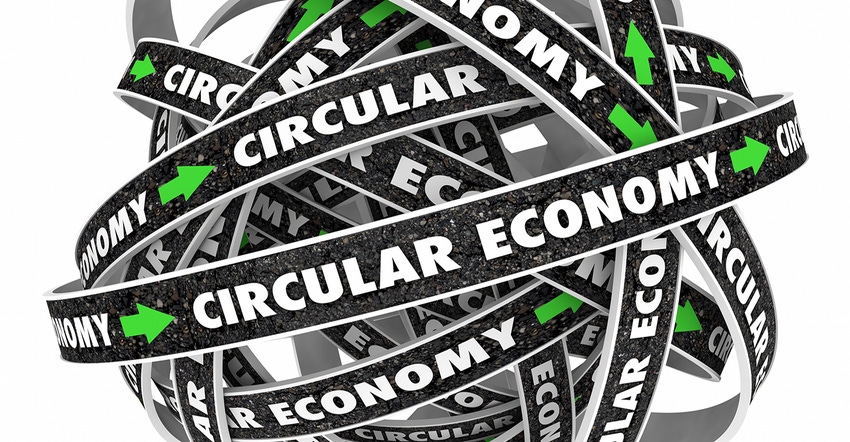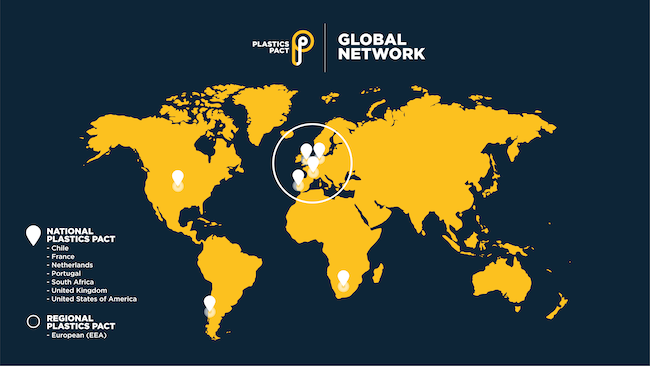U.S. Plastics Pact Articulates Tailored Approach to Circularity
While the U.S. Plastics Pact follows the ambitious precedents set by the existing global Plastics Pact network, it is tailored to meet the unique needs and challenges of the U.S. market.
August 27, 2020

Led by the Recycling Partnership and World Wildlife Fund in partnership with the Ellen MacArthur Foundation, the U.S. Plastics Pact promises a unified approach to achieving circularity in the plastics industry. The pact commits to rethinking the way industry designs, uses, and reuses plastics.
The U.S. Plastics Pact will convene 70 brands, retailers, NGOs, and government agencies across the plastics value chain to bring one voice to U.S. packaging through coordinated initiatives and innovative solutions. This “first-of-its-kind,” collaborative, solutions-focused initiative seeks to drive significant systemic change by unifying diverse cross-sector approaches, setting a national strategy, and creating a scalable path forward toward a circular economy for plastics in the United States by 2025.
Two companies joined the U.S. Plastics Pact this week. The Plant-Based Products Council (PBPC), a “founding activator” of the U.S. Plastics Pact, joined the organization with the recognition that “significant, systemwide change is imperative” to realize a circular economy for plastics. “Plant-based packaging materials offer a wide range of opportunities for addressing the environmental challenges we face today,” said Jessica Bowman, PBPC Executive Director. “The PBPC is proud to join fellow collaborators of the U.S. Plastics Pact in working with stakeholders across the plant-based value chain to guide the global economy to a more sustainable future through the application of circular-economy principles.”
|
The U.S. Plastics Pact reflects national priorities and realities, while moving the United States closer to other developed nations in plastic waste management, said the organization. Image courtesy Ellen MacArthur Foundation. |
Zurich–based Amcor announced on Aug. 26 that it has joined the U.S. Plastics Pact, as well. “As a global leader in the packaging industry, Amcor’s colleagues continuously push themselves and others to achieve more, to understand challenges, and advance transformational change,” said Eric Roegner, President of Amcor Rigid Packaging. “We are already working with customers to increase recycled materials in packaging and increase recycling rates worldwide. The goals of the U.S. Plastics Pact are closely aligned with Amcor’s own sustainability agenda and we can leverage our in-depth industry expertise and resources at scale to advance the transition to a circular economy.”
These two companies, in joining the U.S. Plastics Pact, have agreed to collectively deliver against these four ambitious goals:
Define a list of packaging to be designated as problematic or unnecessary by 2021 and take measures to eliminate it by 2025.
All plastic packaging will be 100% reusable, recyclable, or compostable by 2025.
By 2025, undertake ambitious actions to effectively recycle or compost 50% of plastic packaging.
By 2025, the average recycled content or responsibly sourced bio-based content in plastic packaging will be 30%.
While the U.S. Plastics Pact is complementary to, and follows, the ambitious precedents set by the existing global Plastics Pact network, it is tailored to meet the unique needs and challenges of the U.S. market. The pact will reflect national priorities and realities, while moving the United States closer to other developed nations in plastic waste management, said a statement from the U.S. Plastics Pact.
Creating a unified framework
The first task of the founding members of the U.S. Plastics Pact will be to establish a roadmap in the first quarter of 2021 to identify key milestones and national solutions for achieving U.S. targets and realizing a circular economy in which plastic never becomes waste.
“The U.S. pact will accelerate systemwide change by inspiring and supporting upstream innovation through a coordinated national strategy, creating a unified framework, and enabling members to accelerate progress toward our ambitious 2025 sustainability goals,” said Sarah Dearman, Vice President of Circular Ventures for the Recycling Partnership.
Amcor further commented that it believes “there will always be a role for responsible packaging that offers differentiated functionality while minimizing waste in the environment. A responsible packaging system will require innovative packaging design, improvements to waste management infrastructure, and increased consumer participation.” Amcor added that the company is making progress toward its commitment to make all packaging recyclable or reusable by 2025, significantly increasing the use of recycled materials, and driving greater recycling of packaging around the world.
About the Author(s)
You May Also Like





